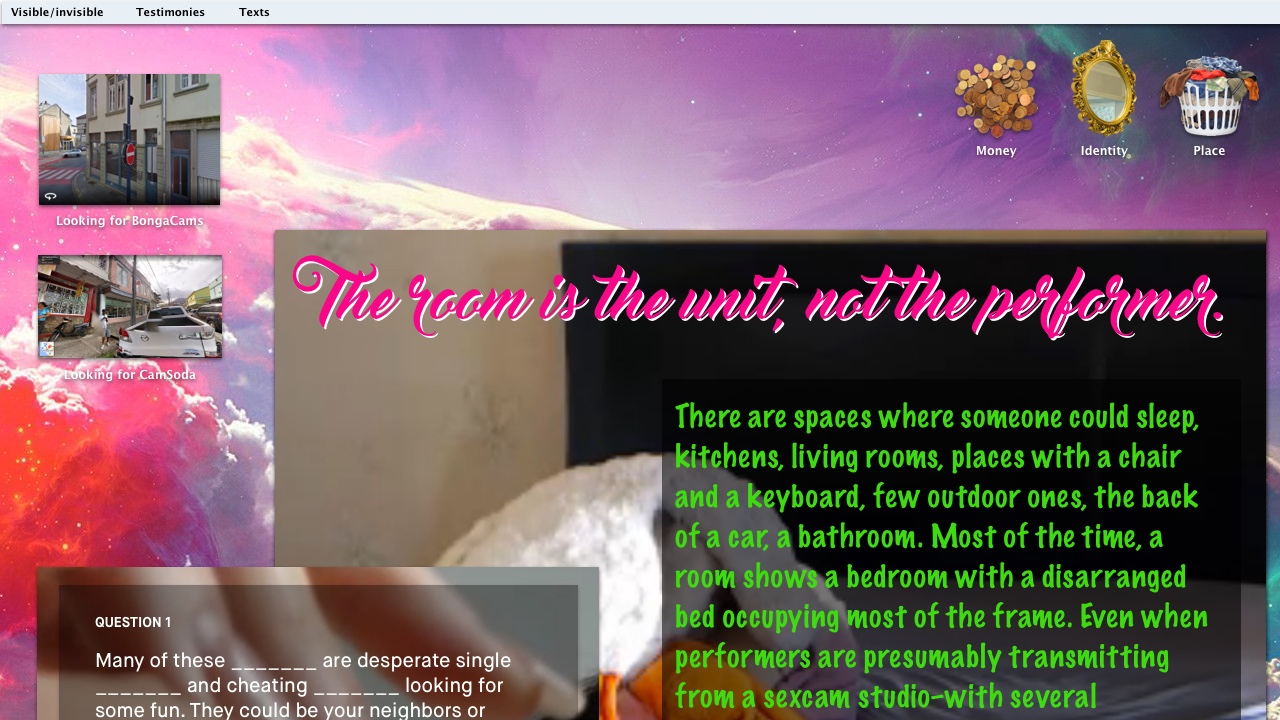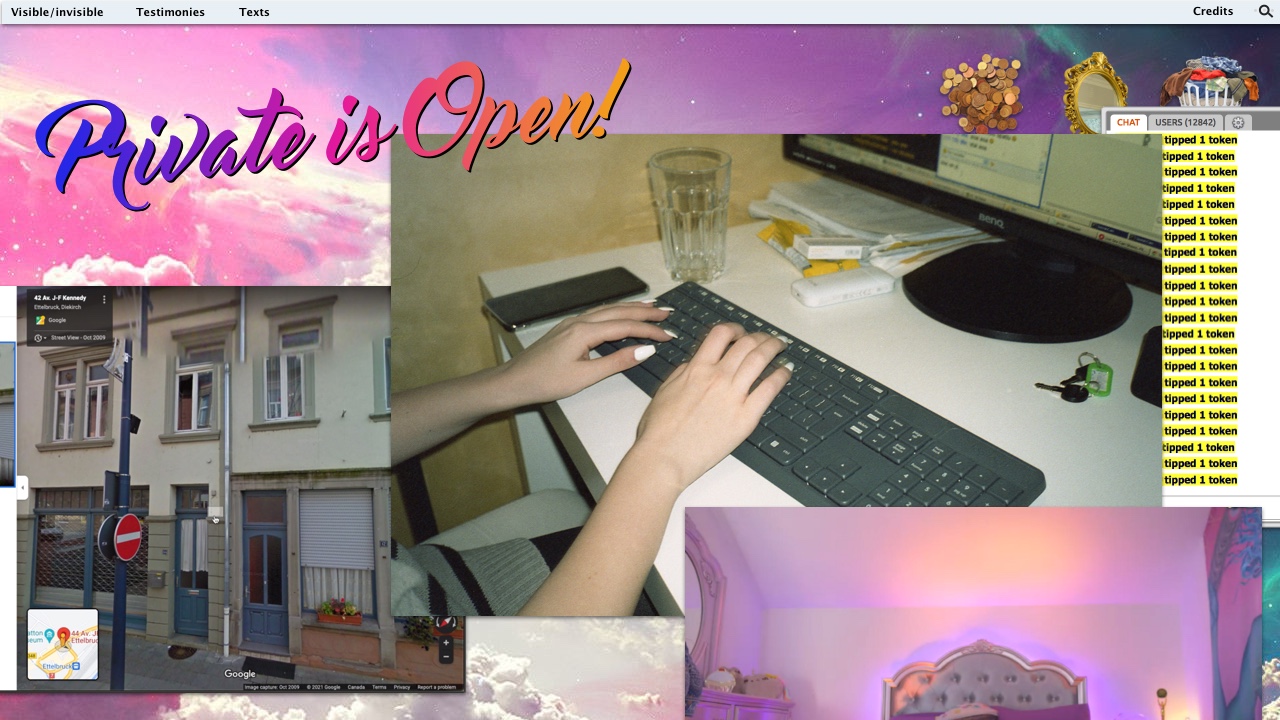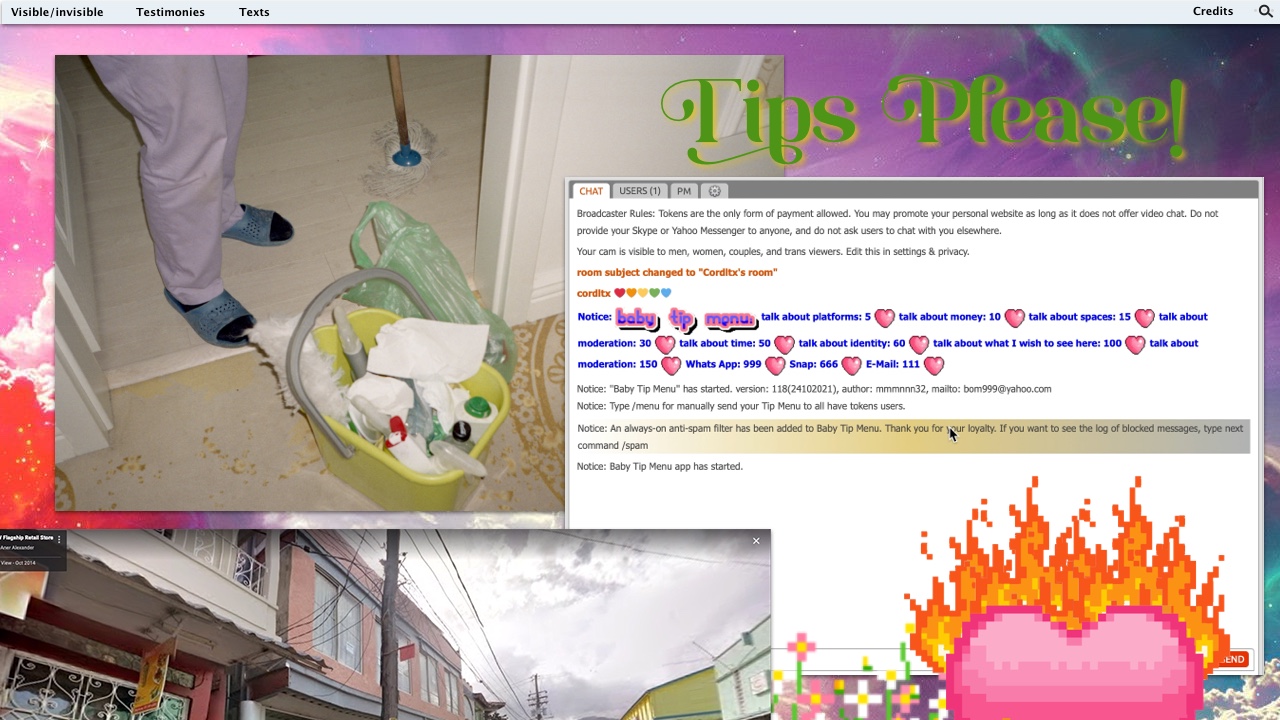Currently Off-Sight



Lotte de Jong + Antonia Hernández
-
Currently Off Sight is an art-based project that explores the politics and poetics of visibility on sex webcam platforms. Rather than exceptions,Currently Off Sight considers sex web cam platforms paradigmatic for the entanglements of work and daily life in a discriminatory environment. As such, sexcam platforms become a magnifying lens to investigate what it means to be visible and invisible online, querying the different strategies and tactics that modulate this visibility. In a context of constant deplatforming, banning, and discrimination of sex and sex workers,[1] Currently Off Sight interrogates visibility as a governance tool.
Despite the asymmetry of power between the sexcam platform and its performers, Currently Off Sight resists a binary understanding of what is visible and invisible in that context. Instead of just making visible what is hidden, this project questions the purpose of rendering things (hyper)visible at the expense of others while exploring the many shades between visible and invisible. Foregrounding webcammers’ voices, this project examines the ways in which visibility manifests on the platform, and the various degrees of agency the different actors have there.
Currently Off Sight interrogates the poetics of visibility on the platform by engaging with the forms that this visibility acquires. The project is divided into chapters, concerning the topics addressed by the webcammers’ testimonies: the circulation of money, the making and presentation of identity, the space of the transmissions, moderation, and surveillance. These topics are formally explored through the media elements present on the platform: audio, video, chat windows, images, and animated gifs. Citing the aesthetics used by the sexcam platform and webcammers’ profiles, these elements are placed on a simulated desktop that works as a stage and place of observation. The desktop serves also as a way to acknowledge the presence of the user in this sexcam entanglement. It is the user, the audience, who must decide what they want to know about the functioning of the platform, what they do want to see.
-
Once peripheral phenomena on the Web, sex webcams gained social and economic relevance with the rise of online platforms, attracting millions of visitors, and becoming an important source of income and intimacy during the pandemic. Sex webcam platforms are often based on an asymmetrical model that allows an invisible audience to observe people in what looks like their domestic environments and decide if they want to pay them—or not. This uneven visibility does not only concern the audience and performers but the platform: while sexcam platforms seem to offer unlimited access to private spaces, they provide little and misleading information about themselves.
Currently Off Sight is an art-based project that explores the politics and poetics of visibility on sex webcam platforms. Rather than exceptions,Currently Off Sight considers sex webcam platforms paradigmatic for the entanglements of work and daily in a discriminatory environment. As such, sexcam platforms become a magnifying lens to investigate what means to be visible and invisible online, querying the different strategies and tactics that modulate this visibility. In a context of constant deplatforming, banning, and discrimination of sex and sex workers,[1] Currently Off Sight interrogates visibility as a governance tool.
Despite the asymmetry of power between the sexcam platform and its performers, Currently Off Sight resists a binary understanding of what is visible and invisible in that context. Instead of trying to make visible what is hidden, this project questions the purpose of making things (hyper)visible at the expense of others while exploring the many shades between visible and invisible. Foregrounding webcammers’ voices, this project examines the ways in which visibility manifests on the platform, and the various degrees of agency the different actors have there.
Currently Off Sight interrogates the poetics of visibility on the platform by engaging with the forms that this visibility acquires. The project is divided into chapters, concerning the topics addressed by the webcammers’ testimonies: the circulation of money, the making and presentation of identity, the space of the transmissions, moderation, and surveillance. These topics are formally explored through the media elements present on the platform: audio, video, chat windows, images, and animated gifs. Citing the aesthetics used by the sexcam platform and webcammers’ personal profiles, these elements are placed on a simulated desktop that works as a stage and place of observation. The desktop serves also as a way to acknowledge the presence of the user in this sexcam entanglement. It is the user, the audience, who must decide what they want to know about the functioning of the platform, what they do want to see.
One of the main attractions of sexcam platforms is the promise of unlimited access to performers’ private spaces. Currently Off Sight challenges this assumption through performers’ testimonies, that speak of intentional decisions on what the audience can and cannot see. Additionally, the project presents videos, images, and virtual tours of professional cam studios that, while inspired by personal spaces, disclose that nobody inhabits them. Contrasting this supposed boundless access, the project shows unsuccessful efforts in trying to find the platforms’ physical locations. Presented as explorations on Google Maps, the audience can share the sense of loss and confusion of these endeavors, where P.O. boxes are the public façade of lucrative and sophisticated companies.
Monetary exchanges incarnate one of the aspects of the sexcam platform. In the first place, payments are often presented as ‘voluntary donations’ and disconnected from work compensations. Abstracting, even more, the role that money plays there, sexcam platforms use custom-made currencies. Because major payment processor providers and credit cards companies deny their services to sex workers, these currencies (tokens) can be bought through the same services, but these cannot be used to cash them. This situation creates two parallel payment ecologies, one for the audience and the other for performers, made of different payment services, policies, and fees. For example, a redeemed token will be worth half of its initial value. Tokens’ obscure management contrasts with the number of visual and aural ways in which they are presented on the sexcam platform.
While Currently Off Sight is an artistic exploration of some of the many ways in which visibility is experienced on a sexcam platform, it addresses an urgent and widespread issue. In today's Internet context, a few powerful companies have control over who has and who does not have the right to be visible. The growing stigmatization of sex workers, as current events demonstrate, creates discriminatory situations with concrete consequences for individuals and communities, affecting their livelihood and rights of expression. Under the conviction that an Internet safe for sex workers is a safer Internet for everyone, Currently Off Sight invites a reflection on the present and the future of the Internet.
REFERENCES
Are, Carolina, and Susanna Paasonen. “Sex in the Shadows of Celebrity.” Porn Studies, September 24, 2021, 1–9. https://doi.org/10.1080/23268743.2021.1974311.
Blunt, Danielle, and Zahra Stardust. “Automating Whorephobia: Sex, Technology and the Violence of Deplatforming: An Interview with Hacking//Hustling.” Porn Studies, November 2, 2021, 1–17. https://doi.org/10.1080/23268743.2021.1947883.
[1] Blunt and Stardust, “Automating Whorephobia”; Are and Paasonen, “Sex in the Shadows of Celebrity.”